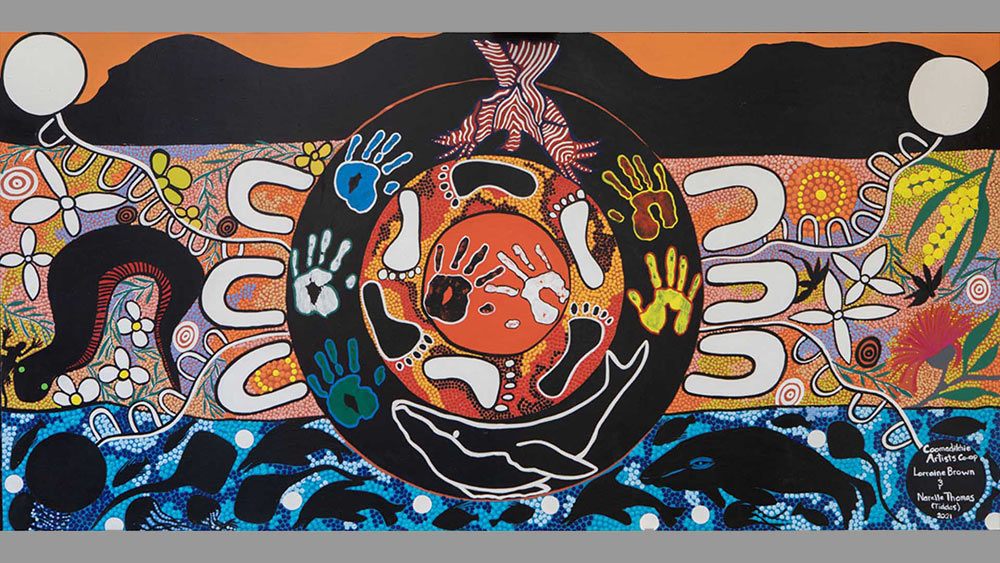March 17, 2022
Reconciliation Action Plan launched
UOW committed to a united approach to equality and inclusiveness, and to walking the reconciliation journey
The University of Wollongong (UOW) launched its Innovate Reconciliation Action Plan on Thursday 17 March with the commitment to provide learning, teaching, and working environments free from racism and discrimination and embrace a united approach to equality and inclusiveness.
The UOW Innovate Reconciliation Action Plan (RAP) 2022 - 2024 aims to build stronger relationships between Aboriginal and Torres Strait Islander peoples and non-Indigenous peoples that benefit all Australians.
The RAP provides the University with the tools to advance Reconciliation with integrity and transparency with an educational plan that shares the responsibilities broadly.
Across the last 18 months, the disruptions of the COVID-19 pandemic and several leadership changes at the University, have provided the opportunity for the new plan to incorporate deliverables from the Inaugural RAP and reassess and prioritise values in the formation of the new plan.
UOW Executive Director of Indigenous Strategy and co-chair of the UOW RAP Steering Committee, Jaymee Beveridge, said the extensive consultation journey has shifted the notion of a RAP being a siloed plan and moved towards “an all-encompassing approach of acknowledging it as everybody’s business”.
“A dramatic and significant shift has occurred at UOW that shines a light on our institution’s evolving commitment to addressing the plight of all Aboriginal and Torres Strait Islander peoples through truth-telling, cultural safety, and healing,” Ms Beveridge said.
“Our new RAP embeds change into every faculty, school and business unit, and is driven by the entire Senior Executive team.”
RAP 2022 - 2024 has been developed through a series of consultation phases across the University community and guided by the UOW RAP Steering Committee and Senior Leadership Team.
The RAP Steering Committee was co-chaired by Ms Beveridge and UOW Deputy Vice-Chancellor (Health and Sustainable Futures) Professor David Currow and included representatives from across the University’s academic and professional services staff, as well as student representatives and non-UOW community members.
Professor David Currow, believes Reconciliation is central to the life of UOW.
“The Reconciliation Action Plan is very much about supporting our current students, potential students and alumni to ensure that the University models what reconciliation should be,” Professor Currow said.
“Ultimately, all of us can make a difference and all of us need to make a difference if we are to realise the full potential of this RAP. The RAP is a great map of what we can do, but the work will only progress if we all own the importance of reconciliation.”
An importance has been placed on cultural capital and community relationships, to be delivered through new Higher Degree Research cultural mentor programs, new HR affirmative action initiatives and the development of a UOW Indigenous Policy.
UOW Vice-Chancellor Professor Patricia M. Davidson was proud to witness the launch of the plan today with the firm commitment to building a better future for Aboriginal and Torres Strait Islander peoples through inclusivity, collaboration, and connectedness.
“The UOW leadership team are committed to walking the reconciliation journey as partners with our Aboriginal and Torres Strait Islander colleagues and community. We are committed to the tough conversations and changes needed ahead,” Professor Davidson said.
“The 2022-2024 Reconciliation Action Plan has an embedded accountability framework and will be an important focus of our University leadership and Council.
“I share the vision for a more equitable and just Australia committed to reconciliation and building a stronger future for our people and planet.”
UOW has reached a number of key milestones in its reconciliation journey since the launch of the inaugural RAP in 2019, including the success of the Jindaola Program expanding beyond UOW, the establishment of the Aboriginal Advisory Committee, embedding baseline cultural capacity modules during staff on-boarding, the introduction of the Vice-Chancellor’s Reconciliation Award, and the creation of an Acknowledgement of Country video, recognising the devastating impact of colonisation.
ABOUT THE RAP ARTWORK - KULCHA AND THE WIDER COMMUNITY
This is a story about the importance of Aboriginal and Torres Strait Islander ‘Kulcha’. Kulcha being a part of the wider community. Acceptance and knowledge help all to understand what Kulcha means to us: what we are a part of and how it’s connected to us as a people of an ancient heritage. Reconciliation is acceptance of each other, where we belong in society, and how respect can bring understanding and creating one nation. No prejudice only open mindedness and acceptance.
ABOUT THE ARTISTS
Lorraine Brown is the premier artist of the Coomaditchie United Aboriginal Corporation. Lorraine is a Yuin/Gunai Kurnai woman born in Bega, one of seven children. Lorraine views her ability to paint as a gift. She uses bold colours that reflect her coastal upbringing.
Lorraine’s sister Narelle Thomas paints with her. Lorraine and Narelle work like professional dancers: one leads and the other follows, and no-one steps on any toes.
